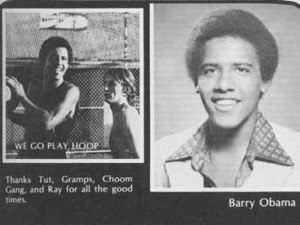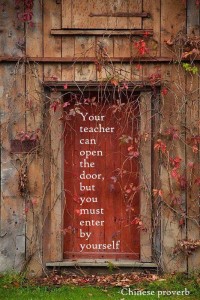The popular phrases that describe two different types of teachers; “Sage on the Stage,” and “Guide on the Side,” are acutely accurate in defining two different approaches in how to guide students in their learning. The title of the picture below, “Your teacher can open the door, but you must enter by yourself,” assumes that the teacher in question is more of a Guide on the Side, who provides the tools to facilitate the learning (opening the door) for the students, as opposed to the Sage on the Stage, who will tell you about the door, but not actually open it for you.
The best teachers, whether in the classroom, or in the “real world” of work and life, are at the student’s side (figuratively) helping them to that door and help them learn how to learn, as opposed to just filling their heads with facts, figures, and other data through rote memorization. For a student to be successful, especially in the modern world’s fast-paced, constantly changing culture and economy, they must take ownership of their own learning, and not depend on the teacher for all of the answers. In that sense, the door (to further learning), is one in which the teacher can help them get to, and help them open, but only the student can go through their own personal door to learning and advance their own knowledge and skills in order to make their way in the world.
What do you think? How can a teacher best help his or her students through the door of learning? Please post your comments below…
As the 2012 Presidential race begins to heat up now that Mitt Romney has chosen his running mate, Wisconsin congressman Paul Ryan, the public is now starting to look in earnest at the four men vying for employment in America’s Executive Branch of government. One aspect to look at in evaluating the competitors is where they attended high school (public school or private school), and what that may or may not say about their policies toward education. Remember, the President (and, to a degree, his vice-president), will have a very large amount of influence on what happens in public education in this country.

Barack Obama’s High School Yearbook Picture
Of the two men running for President (Barack Obama and Mitt Romney), and the two Vice-Presidential candidates (Joe Biden and Paul Ryan), it is perhaps telling that of these four men, only one attended a public high school. Obama spent his high school days in Hawaii, living with his maternal grandparents while atteding the Punahou School, a private, co-ed college prep school situated in Honolulu. While at this private school, Obama participated in sports (basketball), and had what has to be considered a formative experience as one of the few African-American students to attend Punhahou. Is attendance at a private school typical of most African-American kids?
Mitt Romney, whose father served as governor of Michigan for most of his childhood, attended the Cranbrook Schools, Pre-K -12 prep school in Bloomfield Hills, Michigan. Romney spent his middle and high school years at Cranbrook. Romney attended (and was boarded at) Cranbrook from 1959-1965. To say that his experience was typical for any high school student (he participated in cross-country, hockey, and belonged to several clubs), ignores the fact that his dad was the governor of the state, and at Mitt Romney’s high school graduation, his father, The Governor, gave the commencement address. Was Mitt Romney’s high school experience typical for most an American teen?
Joe Biden, the incumbent Vice-President and former Senator from Delaware, attended the Archmere Academy, a private Roman Catholic school located in Claymont, Delaware. The school’s website describes the buildings “a fine example of Italianate, Renaissance architecture,” pointing out that the school grounds used to be the estate for a weathy executive at General Motors and DuPont, and a significant player in national Democratic Party politics. To provide an idea of how exclusive this school is, Archmere’s website lists the 2012-1013 academic year’s cost for attending this private prep school as $21,825. That sum does not include books, uniforms, or the technology fee. One can assume that when Joe Biden attended in the late 1950s and early 1960s, the costs were comparable for that time period.
Paul Ryan, selected by Romney to be his VP candidate on August 11, 2012, is the lone representative of public education in this group. He attended Joseph A. Craig High School in his hometown of Janesville, Wisconsin. His parents did not have to fork over thousands of dollars in tuition, they merely paid their property taxes and school district taxes. From all accounts, Ryan had a typical high school/teenaged experience at his public high school.
So what do their personal high school histories have to do with the presidential race? Well, two of these men will have a significant impact on education policy in the United States. The federal Department of Education has an growing power and influence on public schools, and, by extension, on higher education in this country as well. A question that voters may ask is what do these men actually know about public education? Public schools are often pilloried over test scores, drop-out rates, and a host of other issues. Public schools are tasked with educating every student who walks in their doors. Private schools have an admissions process, similar to colleges and universities. By no means can the student populations and academic achievements of public and private schools be realistically compared as being similar. Conservatives like to denigrate the teacher unions and, at times, the very concept of public education. Liberals like to point out the lower achievement of minority students, and they all have concerns about how special education studens are served in public schools. All these are valid topics of discussion, as positive student achievement is vital to all schools, and for all kids. Where these politicians want to go in terms of public ed may be at least partially based on their own experiences as students so long ago.
What do you think? Post a comment and let us know your thoughts!

